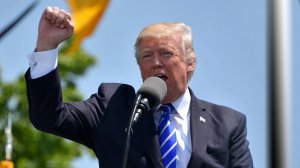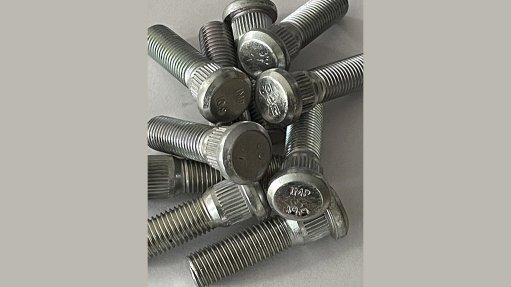Trade opportunities for emerging countries to remain under a Trump Presidency, economist says

In this video, economist Dr Larry Hatheway discusses his views on the economic outcomes of the upcoming US presidential elections
Economist Dr Larry Hatheway has predicted that Donald Trump will win the upcoming US presidential elections against Kamala Harris, which will probably encourage deglobalisation based on the former president’s staunch US-first policy approach.
However, speaking in a webinar on October 29, hosted by financial services company PSG, Hatheway said a likely Trump victory would not necessarily preclude all trade opportunities for emerging countries such as South Africa.
The webinar explored the global economic outlook amid the upcoming election on November 5 and its implications for emerging markets. Hatheway offered insights on the potential consequences of either a Trump or Harris presidency, focusing on shifts in globalisation, US fiscal policies and regulatory approaches.
Hatheway stated that, in a less globalised environment posed by a Trump presidency, those countries that could respond with agility would fare best.
“It's going to require some adaptability, nimbleness, and flexibility to participate. The old way of doing things doesn't seem to be all that promising, unfortunately,” he said.
He explained that emerging markets, typically seen as capital destinations for investment and opportunity, are tied to the fortunes of the global economy, making them vulnerable to shifts in globalisation and trade.
Hatheway said the outlook for emerging markets appeared challenging as US political support for globalisation waned, being supplanted by near- and on-shoring strategies. These approaches, aimed at keeping production closer to home, could stunt development in emerging markets by disrupting traditional pathways to growth through trade and finance.
He noted, however, that ample opportunities remained for emerging countries such as South Africa in the diversification of supply chains, acknowledging that this trend had already begun to materialise.
He said that some emerging markets may indeed benefit from this, but only if they are “ready for it”.
Hatheway indicated that, under a Trump administration, emerging markets with strong commodity exports could benefit from US investments in infrastructure and electrification, supplying crucial raw materials.
He suggested that South Africa may find advantages in this arena, given its diverse resource base, and asserted that technological advancements could benefit emerging markets.
“There are fantastic technological breakthroughs, and there's no real reason why emerging markets can't be part of that story too, depending on skill sets, opportunities, and their attitudes towards business,” Hatheway said.
In terms of the US election’s long-term impact on investment, he said there was no need for concern.
“A very common refrain on Wall Street is that people should not over-exaggerate the importance of the election for their investments in the long term,” he said.
In the long run, he explained, market performance tended to stabilise regardless of which party held the White House.
However, Hatheway noted that there were more immediate concerns over the potential for a contested and close election, causing short-term volatility in global markets.
“We may have a very close, very contested election, potentially with lots of litigation, possibly even some violence,” he said, warning that such uncertainty could linger well into December.
“Uncertainty is typically the enemy of markets, so it would not surprise me if we saw some volatility in markets, particularly given the rosy market conditions in the run-up to the election,” he warned.
If Trump does win, Hatheway said there was a high chance of a Republican “clean sweep” of both the House of Representatives and the Senate, making it much easier for significant policy changes to be passed into law.
A Harris win, on the other hand, would likely result in a divided government, as the Democrats were not likely to win the Senate or even the House, resulting in policy gridlock.
“A divided government sometimes brings with it a certain degree of gridlock, a certain degree of stasis. A clean sweep would bolster the likelihood of enacting key Republican policies, giving more weight to their economic and market agendas. Harris’s legislative agenda is less likely to be passed through Congress easily, if at all,” he said.
Regardless of which party wins the House and the Senate, the new President would still have the authority to increase or reduce tariffs, Hatheway noted.
He indicated that Republican leadership would likely lead to the extension of the 2017 tax cuts, potentially pushing corporate tax rates lower, from 21% to 15%.
He explained that this approach could contribute to an expansion of the US federal deficit over a decade.
“What we can't bank on is expenditure reduction or expenditure control. A Trump administration, under a clean sweep, would lead to an expansion of the US federal government deficit [over ten years] and, therefore, to the stock of federal government debt. This is something we should reckon with,” Hatheway said, suggesting that this could impact on bond markets, as bond prices may fall while yields could rise in response to higher deficit levels.
Additional economic changes under a Trump administration would likely include industry deregulation, with key beneficiaries being the traditional energy sector based on fossil fuels, along with pharmaceuticals and financial services.
Hatheway identified these sectors as “the three big winners” of measures either taken unilaterally by the president, through executive order, or legislatively, with assistance from Congress to push the deregulation agenda. These sectors would likely face much heavier regulation under a Harris administration.
He noted that tariffs on Chinese goods would likely increase, potentially as part of a strategy to compensate for reduced tax revenue.
“Tariffs don't require legislative approval, and it is fairly clear that tariffs, at least on Chinese-made goods, would go up. Trump has talked about using tariffs as a way to offset some of the tax reductions,” Hatheway noted, pointing out that these tariffs might extend beyond China, as Trump’s previous administration applied tariffs to goods from Canada, parts of Europe and Mexico.
Considering the impact of each candidate’s policies on the US Federal Reserve (Fed), Hatheway agreed that Trump’s fiscal policies would likely encourage a “hawkish Fed,” while Harris’s would favour a more “dovish” approach.
He stated that larger deficits, stimulated by Trump’s policy stance, would slow the Fed’s pace on easing policies.
“The Fed will continue to ease, but it’s also relative to what is expected,” he said.
Trump’s policies, focused on lowering taxes and increasing debt, could boost interest rates and strengthen the dollar.
“One of the paradoxes of the Trump policy is that it would probably lead to a stronger dollar simply because of the higher interest rate environment, perhaps a slightly better growth environment, and certainly a higher return on capital,” Hatheway explained.
However, he suggested that a stronger dollar and rising US interest rates would have ripple effects for the global economy and particularly for emerging markets, including South Africa.
“Any escalating trade tension is likely to drive US interest rates and the dollar higher,” he said, which could present difficulties for emerging markets reliant on US trade.
Over the longer term, however, Hatheway argued that restricting global trade would suppress growth universally, eventually leading to even lower interest rates as growth rates become more subdued in a deglobalised world.
While these impacts would only be felt in the long run, the more immediate effects of a Trump presidency would likely involve short-term price increases owing to tariffs.
“For a lot of industries, this will be a difficult challenge for them. Their input costs will go up. They'll probably push that along as much as they can. There may be some measured increase in inflation, but it's not genuine inflation. This is not an enduring set of price increases. This is effectively a set of one-off price increases due to tariffs,” Hatheway explained.
However, he added that, in the longer run, a more deglobalised world would lead to lower growth rates, reduced interest rates, and possibly a weaker dollar.
“But none of that will matter much for investors. In that first year, it's more about rising interest rates and a stronger dollar,” Hatheway said.
Article Enquiry
Email Article
Save Article
Feedback
To advertise email advertising@creamermedia.co.za or click here
Press Office
Announcements
What's On
Subscribe to improve your user experience...
Option 1 (equivalent of R125 a month):
Receive a weekly copy of Creamer Media's Engineering News & Mining Weekly magazine
(print copy for those in South Africa and e-magazine for those outside of South Africa)
Receive daily email newsletters
Access to full search results
Access archive of magazine back copies
Access to Projects in Progress
Access to ONE Research Report of your choice in PDF format
Option 2 (equivalent of R375 a month):
All benefits from Option 1
PLUS
Access to Creamer Media's Research Channel Africa for ALL Research Reports, in PDF format, on various industrial and mining sectors
including Electricity; Water; Energy Transition; Hydrogen; Roads, Rail and Ports; Coal; Gold; Platinum; Battery Metals; etc.
Already a subscriber?
Forgotten your password?
Receive weekly copy of Creamer Media's Engineering News & Mining Weekly magazine (print copy for those in South Africa and e-magazine for those outside of South Africa)
➕
Recieve daily email newsletters
➕
Access to full search results
➕
Access archive of magazine back copies
➕
Access to Projects in Progress
➕
Access to ONE Research Report of your choice in PDF format
RESEARCH CHANNEL AFRICA
R4500 (equivalent of R375 a month)
SUBSCRIBEAll benefits from Option 1
➕
Access to Creamer Media's Research Channel Africa for ALL Research Reports on various industrial and mining sectors, in PDF format, including on:
Electricity
➕
Water
➕
Energy Transition
➕
Hydrogen
➕
Roads, Rail and Ports
➕
Coal
➕
Gold
➕
Platinum
➕
Battery Metals
➕
etc.
Receive all benefits from Option 1 or Option 2 delivered to numerous people at your company
➕
Multiple User names and Passwords for simultaneous log-ins
➕
Intranet integration access to all in your organisation


















